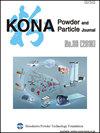Carbonation Kinetics of Fine CaO Particles in a Sound-Assisted Fluidized Bed for Thermochemical Energy Storage
IF 3.2
4区 材料科学
Q3 ENGINEERING, CHEMICAL
引用次数: 2
Abstract
The calcium-looping process, relying on the reversible calcination/carbonation of CaCO 3 , is one of the most promising solution to perform thermochemical energy storage (TCES) for concentrating solar power (CSP) plants. Indeed, CaO precursors such as limestone can rely on the high energy density, low cost, large availability and nontoxicity. In this work, the study of the sound-assisted carbonation of fine CaO particles (< 50 μm) for TCES-CSP has been furthered. In particular, a kinetic study has been performed to analyse the effect of the particular carbonation conditions to be used in TCES-CSP applications, i.e. involving carbonation under high CO 2 partial pressure and at high temperature. All the experimental tests have been performed in a lab-scale sound-assisted fluidized bed reactor applying high intensity acoustic field with proper frequency (150 dB–120 Hz). The carbonation kinetics has been analysed by applying a simple kinetic model, able to properly describe the fast (under kinetic control) and slow (under diffusion control) stage of the of the reaction. In particular, the reaction rate, the intrinsic carbonation kinetic constant and the characteristic product layer thickness have been evaluated, also highlighting their dependence on the temperature between 800 and 845 °C; a value of 49 kJ mol –1 has been obtained for the activation energy. Finally, a good agreement between the conversion-time profiles, evaluated from the applied kinetic models, and the experimental data has been obtained.声助流化床热化学储能中细小CaO颗粒的碳化动力学
依靠碳酸钙可逆煅烧/碳酸化的钙环工艺,是聚光太阳能发电厂(CSP)最有前途的热化学储能(TCES)解决方案之一。事实上,CaO前体如石灰石可以依靠高能量密度、低成本、大可用性和无毒性。本文进一步研究了TCES-CSP中< 50 μm细颗粒的声辅助碳化。特别是,进行了动力学研究,以分析用于TCES-CSP应用的特定碳化条件的影响,即在高CO 2分压和高温下进行碳化。所有实验都是在实验室规模的声辅助流化床反应器中进行的,实验采用适当频率(150 dB-120 Hz)的高强度声场。用一个简单的动力学模型分析了碳化动力学,该模型能很好地描述反应的快(在动力学控制下)和慢(在扩散控制下)两个阶段。对反应速率、本征碳化动力学常数和特征产物层厚度进行了分析,并指出了它们对800 ~ 845℃温度的依赖性;得到的活化能为49 kJ mol -1。最后,应用动力学模型计算的转化时间曲线与实验数据吻合较好。
本文章由计算机程序翻译,如有差异,请以英文原文为准。
求助全文
约1分钟内获得全文
求助全文
来源期刊

KONA Powder and Particle Journal
工程技术-材料科学:综合
CiteScore
8.40
自引率
4.90%
发文量
35
审稿时长
>12 weeks
期刊介绍:
KONA publishes papers in the broad field of powder science and technology, ranging from fundamental principles to practical applications. Papers describing technological experience and critical reviews of existing knowledge in special areas are also welcome.
 求助内容:
求助内容: 应助结果提醒方式:
应助结果提醒方式:


